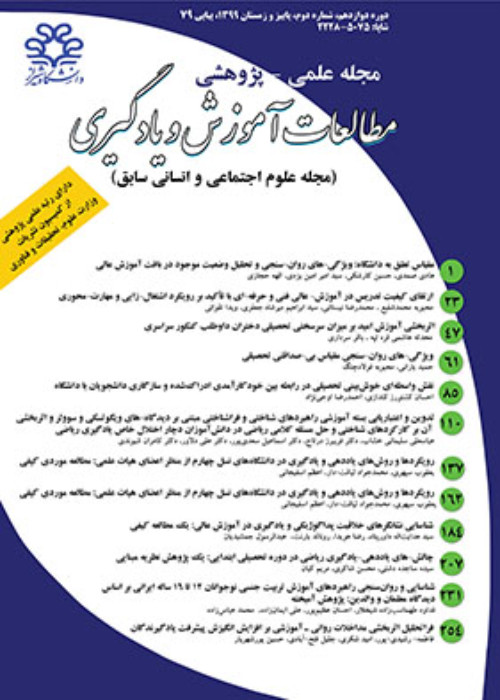Academic Dishonesty and Epistemological Beliefs: Verifying the Mediating Role of Gender
Author(s):
Article Type:
Research/Original Article (دارای رتبه معتبر)
Abstract:
Introduction
In the moral psychological domain, it is important to investigate role of facilitator variables on moral action. Academic dishonesty is a sensitive and prevalent problem in academic contexts. This concept defined as the intent or effort made to illegally use documents and information to obtain academic credentials. Academic dishonesty as an amoral action in such educational contexts as schools and universities. The present research, based on Anderman and Murdak's conceptual model, examined the role of epistemological beliefs in the tendency toward academic dishonesty. Personal epistemology concerns beliefs about knowledge and knowing. Therefore, more empirical research is needed to examine the dimensionality of academic dishonesty and to verify whether the relations between those dimensions and motivational beliefs depends on knowledge and knowing. In other words, it is probable that such beliefs have a regulatory function in determining academic achievement and moral behaviors in educational contexts. In particular, there is a great need to investigate personal epistemology and its relation to academic dishonesty in the Iranian culture.Research question
To this end, the present study aims to investigate the role and contribution of personal epistemological beliefs in determining academic dishonesty and learning outcomes and further to determine the role of gender in this regard. The research questions were: 1-What types of epistemic beliefs are predictive of academic dishonesty? 2-How does gender affect the relationship between epistemological beliefs and academic dishonesty?
Method
The present study examined role of epistemological beliefs in predicting academic dishonesty as an indication of moral behaviors and further to verify the role of gender as a mediating variable. The Participants were 370 under graduate students at Shiraz University (276 females and 94 males). The participants completed the epistemic beliefs inventory (Schraw, Bendixen & Dunkle, 2002) and the cheating questionnaire (Khamesaan & Amiri,2011). The software programs used in this study were SPSS19 and WARP8.5. T-test, exploratory factor analysis and correlational analysis were conducted using SPSS, and path analysis was performed with WARP.Result
The dimensionality of the Schraw, Bendixen, and Dunkles Epistemological Questionnaire was verified through factor analysis, and the resulting dimensions were examined. The result demonstrated a significant path between components of academic dishonesty (plagiarism, active cheat and passive cheat) and epistemological beliefs (innate ability and quick learning). Moreover, the mediating role of gender in the model was confirmed. The model was fitted the data and the fitness indices were desirable. In fact, the desire in girls to learn more quickly was the variable that could best predict their academic dishonesty. On the other hand, the innate ability was the factor that could best predict active or passive cheating in boys.Discussion and
Conclusion
In sum, the result of the research supported the role of epistemological beliefs as well as gender in determining moral behaviors. In this regard, the results highlighted the role of gender schema in determining academic dishonesty. Epistemological beliefs predict instances of academic dishonesty in Iranian students and thus play an important role in this educational context. Similarly, naïve realism was found to increase the likelihood of displaying an amoral behavior. It is assumed that by changing beliefs from naive realism to complex relativity, the likelihood of ethical behaviors in academic relationships will increase.However, more empirical research is needed to ascertain this issue. However, taking the assumption that by moving from naïve realism toward a more critical and constructive perception, chances of academically dishonest behaviors will decline, the results of the present study have implications for families, teachers, psychologists, and counselors. Primarily, the instructors need to provide atmospheres reinforcing stronger and more authentic beliefs so that they can reduce chances of academic dishonesty, which naïve realism might cause. Moreover, the results of the study imply for counselors and psychologists to consider their clients epistemological beliefs, particularly when dealing with their academic dishonesties.
Language:
Persian
Published:
Studies in Learning & Instruction, Volume:10 Issue: 1, 2018
Pages:
112 to 130
magiran.com/p1879791
دانلود و مطالعه متن این مقاله با یکی از روشهای زیر امکان پذیر است:
اشتراک شخصی
با عضویت و پرداخت آنلاین حق اشتراک یکساله به مبلغ 1,390,000ريال میتوانید 70 عنوان مطلب دانلود کنید!
اشتراک سازمانی
به کتابخانه دانشگاه یا محل کار خود پیشنهاد کنید تا اشتراک سازمانی این پایگاه را برای دسترسی نامحدود همه کاربران به متن مطالب تهیه نمایند!
توجه!
- حق عضویت دریافتی صرف حمایت از نشریات عضو و نگهداری، تکمیل و توسعه مگیران میشود.
- پرداخت حق اشتراک و دانلود مقالات اجازه بازنشر آن در سایر رسانههای چاپی و دیجیتال را به کاربر نمیدهد.
In order to view content subscription is required
Personal subscription
Subscribe magiran.com for 70 € euros via PayPal and download 70 articles during a year.
Organization subscription
Please contact us to subscribe your university or library for unlimited access!



